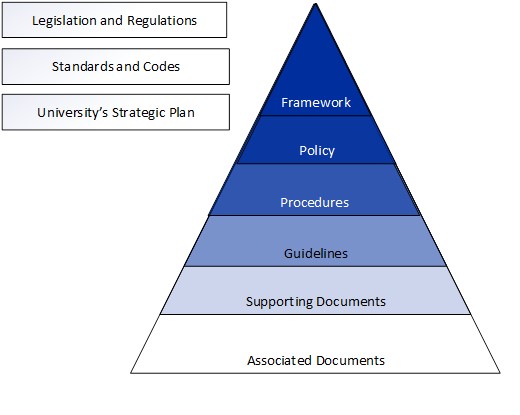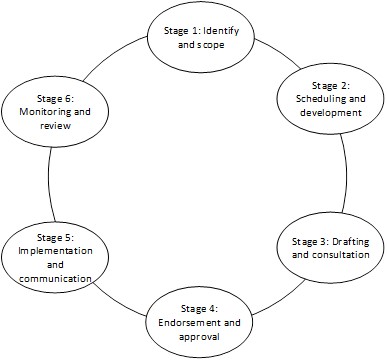1. Purpose
1.1 This policy sets out the University’s approach to policy documents and related governance documents within the University and articulates principles for consistency in the management of these throughout their lifecycle.
1.2 This policy must be read in conjunction with the linked University Policy Documents - Procedures.
2. Scope and application
2.1 This policy applies to all members of the University.
3. Definitions
3.1 Refer to the University’s Glossary of Terms for definitions as they specifically relate to policy documents.
4. Policy statement
4.1 This policy establishes categories of policy documents and sets out requirements and standards for each step of the policy lifecycle. All policy documents must be developed, deployed, monitored and revised in accordance with this policy, which is approved and overseen by the Council.
5. Principles
5.1 The University’s policy documents support compliance with legislative obligations; enable consistent, fair practice; and encourage consistency with community, discipline and professional expectations.
5.2 Policy documents are developed, managed and stored in accordance with the policy lifecycle and must:
(a) provide measurable and transparent limits within which members of the University community can manage their University related activities;
(b) be written in plain and inclusive language;
(c) sequence information logically;
(d) seek to mitigate risks and maximise opportunities for the University;
(e) not be unnecessarily burdensome; and
(f) be consistent with:
(i) applicable laws and regulations;
(ii) the University's vision, mission and values;
(iii) the principles of academic freedom and freedom of speech as set out in the Freedom of Speech and Academic Freedom – Governing Policy;
(iv) community expectations; and
(v) any policy documents above in the policy hierarchy.
5.3 The effectiveness of policy documents must be monitored and reported on an ongoing basis.
5.4 All members of the University are expected to always adhere to all requirements of policy documents.
6. Policy hierarchy
6.1 The policy hierarchy as documented in Figure 1- Policy hierarchy strategy demonstrates how policy documents are organised within the University. All documents must align to the documents at the top of the hierarchy and comply with the relevant legislation and regulations.
Figure 1 – Policy hierarchy strategy

6.2 Framework
6.2.1 University frameworks are management documents that draw together and integrate a range of policy documents, related plans, reference documents, templates, and guidance documentation within the policy document category.
6.2.2 Frameworks can include operational plans and be public or internal documents, depending on the nature of the subject.
6.2.3 Frameworks are created through engagement with the Policy Team, approval by the Vice-Chancellor and President and are maintained, through regular review.
6.3 Policy
6.3.1 A policy is a statement of principles that directs the decision making and operation that supports the achievement of the University’s vision and strategic plan. Policies have a long-term focus and are applied across the University as a whole. They form the foundation of the University’s governance processes and the basis of the quality system.
6.3.2 Policies support the achievement of quality outcomes, address compliance with legislative obligations, and reduce institutional risk by establishing standards and internal controls. The principles outlined in policy are shaped by:
(a) the legislation and regulations that govern the University;
(b) national standards and community expectations;
(c) the values and vision the University articulates in its strategic plan; and
(d) a commitment to respecting human rights within a free, tolerant and inclusive society.
6.3.3 There are three categories of policy:
(a) governing policy relates to the strategic positioning or investment, risk management, fiduciary responsibility, legislative and common law compliance. It gives effect to statutory or regulatory requirements (unless otherwise delegated) and relates to the processes of decision making and the controls and behaviours that support effective accountability and performance outcomes;
(b) academic policy relates to the core academic business of the University and covers matters of learning, teaching and research; and
(c) operational policy relates to policy designed to support strategic intent and articulates both operational imperatives and outlines principles for administrative activities.
6.3.4 All policies are centrally stored in the University’s Policy Library that is managed by the Policy Team.
6.4 Procedures
6.4.1 Procedures must align to a policy and detail the processes and actions aligned with the policy principles.
6.4.2 Procedures outline the operational steps required to implement the policy and must:
(a) provide clear instructions on the way policy should be implemented;
(b) step through the actions required to implement policy principles;
(c) assign responsibilities; and
(d) enable monitoring of policy implementation.
6.4.3 All procedures are centrally stored in the University’s Policy Library that is managed by the Policy Team.
6.5 Guidelines
6.5.1 Guidelines must align to procedures and provide further detailed guidance on how to undertake a procedural element.
6.5.2 Guidelines also provide advice which assist in the establishment and implementation of effective practices to achieve quality outcomes.
6.5.3 All guidelines are centrally stored in the University’s Policy Library for externally available documents or the Internal Policy Documents Library (login required) for internal documents both managed by the Policy Team.
6.6 Supporting documents
6.6.1 Supporting documents detail the process within a business area for completing a specific task.
6.6.2 Supporting documents are managed by the business area however, a central record of all local documents and their locations is maintained by Policy Team.
6.6.3 Supporting documents can be referred to as Standard Operating Procedures (SOP), work guides. handbooks or manuals.
6.7 Associated documents
6.6.1 Associated documents are documents created to assist in the application of policy documents and can include forms, or document templates. 6.6.2 All associated documents are managed within the related business area.
6.2.3 The creation, amendment or removal of an associated document must be approved by the Designated Officer of the highest-level policy document that it is connected to.
7. Policy lifecycle
7.1 This section must be read in accordance with the University Policy Documents - Procedures.
7.2 The policy lifecycle, as depicted in Figure 2 – Policy lifecycle details the process for the management of policy documents.
Figure 2 – Policy lifecycle

8. Monitoring and reporting
8.1 Policy Team report annually to Governance Committees on the monitoring and review of policy documents.
8.2 Policy Team regularly reports to Governance Committees on the amendments made to policy documents along with any exceptions to policies approved.
9. Authorities and responsibilities
9.1 As the Approval Authority, Council approves this policy in accordance with the University of the Sunshine Coast Act 1998 (Qld).
9.2 As the Responsible Executive Member the Vice-Chancellor and President can approve procedures and guidelines to operationalise this policy. All procedures and guidelines must be compatible with the provisions of this policy.
9.3 As the Designated Officer the Director, Governance and Risk Management can approve associated documents to support the application of this policy. All associated documents must be compatible with the provisions of the policy.
9.4 This policy operates from the last amended date, with all previous iterations of policies on University policy documents replaced and no longer operating from this date.
9.5 All records relating to University policy documents must be stored and managed in accordance with the Records Management - Procedures.
9.6 This policy must be maintained in accordance with the University Policy Documents – Procedures and reviewed on a standard 5-year policy review cycle.
9.7 Any exception to this policy to enable a more appropriate result must be approved in accordance with the University Policy Documents – Procedures prior to deviation from the policy.
9.8 Refer to Schedule C of the Delegations Manual in relation to the approved delegations detailed within this policy.
10. Appendices
Appendix 005 – Policy Documents Amendment Approval table
END
